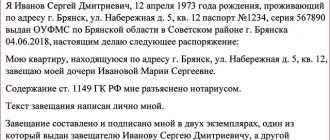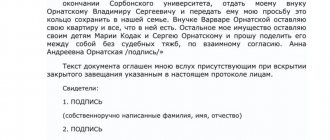1
The transfer of property rights of the testator is carried out in two ways. The main option is that the heirs accept the property according to the law. You can change the established order using a will. The last will of the testator is subject to notarization. The exceptions are cases of military service, imprisonment, and hospital treatment. The law also provides for the possibility of drawing up a will in emergency circumstances. Let's try to figure out what it is and what is the procedure for drawing up such orders.
What is considered an emergency?
The legislation does not contain the precise wording of “extraordinary circumstances”. Therefore, this issue is considered individually. But, as follows from the concept, this is a situation that threatens the life and health of a citizen.
A prerequisite is the unexpectedness of the situation. If a citizen knew that such a situation was possible, then the likelihood that the situation would be recognized as an emergency is reduced.
Variants of dangerous situations:
- Military conflict.
- Terrorist act.
- Natural disasters.
- Man-made disasters.
- Accidents.
Example. A 39-year-old man was at home on Saturday. I felt unwell and called an ambulance. Before the ambulance arrived, he drew up a will on a piece of paper. The neighbors confirmed it with their signatures. After arriving at the hospital, the testator died of a heart attack.
This situation will be considered an emergency, even if the man was at risk for cardiovascular diseases.
Example. A 40-year-old woman had a chronic disease. For a year she could not walk, moved in a wheelchair, and suffered 3 strokes. She was looked after by her niece, to whom she promised to leave the apartment as an inheritance. On Thursday her health deteriorated and she made a will for her niece. The doctor and paramedic assured him. An hour later the testator died.
This situation will not be considered an emergency. The testator knew that her health was poor and she had been ill for several years. The condition worsened gradually. She had the opportunity to contact a notary or call him to her home. But she didn’t take advantage of this opportunity.
Despite the similarity of situations, one will be considered an emergency and the other will not. Thus, we can conclude that this issue is considered on an individual basis. If the cause of death is illness, for the situation to be considered an emergency, it must be sudden and premature for the testator.
Pros and cons of a joint will
A general will is a well-known definition in a number of European countries (Germany, Great Britain and others). It was used on the territory of Crimea and Sevastopol during the period they were under Ukrainian jurisdiction. According to the special law of the Russian Federation, these documents remain in force. In Russian law, new provisions raise many questions that will likely be resolved as judicial practice emerges.
The possibility of revoking a joint will after the death of one of them looks ambiguous. The norm was introduced as a reliable mechanism for transferring acquired property, first to the surviving spouse, and subsequently to an heir chosen by them jointly. Most countries have a provision that prevents the surviving spouse from changing the heir or disposing of the property as he or she wishes.
“Many lawyers believe that the right to draw up a new document after the death of one of the spouses, or to cancel an old one, should be granted only in relation to later acquired property. This seems fair because it prevents the surviving spouse from violating the rights of the deceased.”
For example, the husband registered a remarriage. Today, nothing prevents him from donating part of the property to children born in a new family. He can cancel a previously drawn up document and draw it up in favor of other heirs, which violates the will of the deceased. This reduces the new legal norm to zero.
The law allows a joint will to be challenged after the death of one of the spouses, or the subsequent death of the surviving spouse, at the suit of persons who consider their rights to be violated. But even if there is a legal opportunity to cancel the document at any time, this will do little to help the disadvantaged heir.
At the moment, it is advisable for spouses intending to draw up a joint will to obtain advice from a notary explaining all the positive and negative consequences of their decision.
How to make a will in emergency circumstances?
The law allows an owner who finds himself in a dangerous situation to formalize his will.
Of course, this is a less reliable option compared to a notary, but suitable for a hopeless situation. An important condition is to draw up a will precisely at the moment of a dangerous situation with an immediate threat to life. If the testator draws up a document in advance, before a threat to life occurs, the court will refuse to recognize the situation as an emergency.
Basic requirements for a will executed in an emergency:
- drawn up in writing;
- written by the testator in his own hand;
- signed by the testator personally (without the participation of the hand-applyer);
- signed by 2 witnesses (literate, Russian-speaking, adults);
- cannot contain ambiguous wording;
- the title of the document should be – Will;
- cannot contain an order to create an inheritance fund;
- cannot be a joint will of the spouses.
A will drawn up in an emergency situation is subject to the rules on compulsory heirs. If a citizen does not take into account their rights in their expression of will, they can go to court and challenge the document.
Requirements for the testator and witnesses
The testator and witnesses at the time of drawing up the document must be:
- adults;
- capable;
- be of sound mind;
- not be under the influence of alcohol or drugs;
- do not take medications that affect the adequate perception of reality.
The law does not impose any special requirements on the paper on which the order is drawn up. The only condition is the absence of extraneous inscriptions.
Will form
There is no single form for expression of will issued in an emergency situation. But from judicial practice we can conclude what a document should look like in order for it to be approved by the court.
The document is drawn up in a single copy.
Key points:
- Name – Will. If this is not indicated, the court will immediately refuse to recognize the document, since without a name the will of the deceased to bequeath the property is not visible.
- Applicant details (full name, residential address). Additionally, you can specify your passport information.
- List of property. If all property is transferred to one legal successor, then you can indicate “all my property, wherever it is located and whatever it is expressed in.”
- Heirs data. It is advisable to indicate your full name. and who the person is related to the owner of the property (my daughter, Ilyina Vladislava Yuryevna, 02/05/1986). Since it is not always possible to include the passport details of the heir in the document, you need to indicate his details as accurately as possible.
- Owner's signature.
- Signatures and details of witnesses.
Note! There should be no double interpretation. It should be clear from the text exactly what the testator wanted.
Sample will
Is it possible to rewrite a will at a notary or replace it with a deed of gift?
When is the will announced and what to do after?
Drafting sample
The legislator does not put forward any requirements for the form of drawing up a will created in emergency circumstances that can be regarded as threatening a person’s death. However, it must be extremely clear. It requires a lack of ambiguity. It is not at all easy to follow all the rules of the Russian language in emergency conditions, but this will help the heirs avoid trouble. But this is precisely what, as a rule, the testator achieves.
The free written form allowed for this type of document does not imply the use of a single drafting template. However, as an example, you can give the following document:
You can also indicate the passport details of the testator, heirs and witnesses. Traditionally, in documents, numbers are written entirely in letters, but if conditions do not allow, numbers can also be used. The testator also has the right to describe the situation in which the will was drawn up and name the reason for its “unconventional” form.
Consequently, the opportunity to leave a will without resorting to the services of a notary, when this is impossible to do, is a guarantee of the legislator to fulfill a person’s rights to express and carry out his last will. If the person remains alive, he still has time to notarize his order.
How to enter into an inheritance under a will drawn up under emergency circumstances?
The procedure for entering into an inheritance under a will drawn up in a dangerous situation has significant differences.
A written document itself has no legal force. Therefore, if the procedure is not carried out properly, the right to the property will pass to the heirs under the previous will, and if the will was not previously drawn up, then to the heirs by law.
Algorithm of actions:
- Find the will.
- Collect documents.
- File a claim.
- Pay the state fee.
- Go to court.
- Get a court decision.
- Contact a notary to register an inheritance.
For the document to enter into legal force, the heir must go to court and recognize the situation in which the order was issued as an emergency. The proper plaintiffs in the proceeding are:
- heir specified in the will;
- guardian of the heir if the successor is a minor or incapacitated;
- guardian of the heir if he is a minor or has limited legal capacity;
- representative of the heir - legal entity.
An interested person can file an application with the court independently or involve a representative.
To transfer the power to go to court to protect legitimate interests, it is necessary to prepare a notarized power of attorney. The defendant in the process is the heirs who would have received the property if this expression of will had not occurred. If the deceased did not make a will and has no relatives or dependents, then the district administration is indicated as the defendant.
Find a will
Please note that a will made in an emergency situation is not so easy to find. It is drawn up in writing and without the participation of a notary. Therefore, it will not be possible to obtain a duplicate, as is the case with a declaration of will drawn up by a notary.
Thus, there is no single option on how to find such an order.
Collect documents
To recognize the situation in which a will was drawn up as an emergency, it is necessary to prepare the following documents:
- plaintiff's civil passport;
- death certificate of the deceased;
- original will;
- a certificate of the deceased’s last place of residence;
- receipt of payment of state duty;
- evidence that the situation was life-threatening to the deceased.
The following can be provided as evidence:
- witness statements;
- information from the media about a natural disaster;
- information from a medical organization;
- certificate of calling an ambulance;
- other information depending on the situation.
Note! The burden of proof rests on the plaintiff. It is he who must prove that at the time of drawing up the will the life and health of the deceased was in danger.
File a claim
A statement of claim to establish the fact of drawing up a will in emergency circumstances and recognition as an heir under a will must include the following information:
- name of the court;
- information about the applicant;
- information about the defendant;
- state duty;
- name of the application;
- information about the testator;
- the situation that led to his death;
- information about the property of the deceased;
- grounds for recognizing a situation as an emergency;
- reference to law;
- claim;
- list of documents in the attachment;
- date and signature.
Sample claim
Pay the state fee
The amount of the state duty is calculated for each requirement individually.
If the claim contains demands:
- on establishing the fact of drawing up a will in emergency circumstances;
- on inclusion in the inheritance property;
- on recognition as an heir under a will,
In this case, the state duty will be 900 rubles. (300 rubles for each requirement).
If, in addition, the heir wants to recognize the right of ownership of the inherited property, then it will be necessary to attach to the claim a report on the value of the inherited property and calculate the fee for the property claim. That is, at least 400 rubles. and no more than 60,000 rub. (depending on the value of the property).
Go to court
Procedure for going to court:
- The application is submitted to the district court at the place of registration of the defendant.
If the defendant is a municipality, then at the location of the district administration. Documents can be sent to the court in person, by mail or through a representative. - 5 days after the court receives the documents, a ruling is made to accept it for consideration (Article 133 of the Code of Civil Procedure of the Russian Federation). The heir must inform the notary conducting the inheritance case about this so that he can suspend the issuance of a certificate of inheritance rights for the period of the trial.
Get a court decision
If the court renders a verdict in favor of the applicant, then it is necessary to obtain a court decision. The document will come into force 30 days from the date of issue.
- After 30 days, you must contact the court office to affix a mark on the decision to enter into legal force.
- If the statement of claim was filed before the expiration of the 6-month period for entering into the inheritance, then the court decision must be presented to a notary for further registration of the inheritance.
If the period has already expired, then it is necessary to include in the claim a demand for the annulment of the issued certificates of inheritance rights and for the recognition of property rights in the order of inheritance.
What evidence will the court require to recognize the will as valid?
This requires evidence in the form of witness signatures and testimony, as well as expert opinions about the emergency situation that occurred. For example, this is a medical report drawn up based on the results of the autopsy and confirming the fact of death (somewhat extended in time, which made it possible to draw up a testamentary instruction).
Deadlines for filing a lawsuit
The right to inheritance is subject to execution only if the period allowed for this is observed - 6 months. There are also deadlines for filing a claim. However, their duration depends on the specifics of the claim, i.e. the reason for filing the claim. And in these cases the terms are longer.
Variations in limitation periods:
- a will characterized as void does not require proof, therefore the terms are not defined;
- invalidation of a will lasts from one year to three years in accordance with Art. 181 Civil Code of Russia.
Under normal circumstances, a will that is not legally certified is void. Since extraordinary circumstances allow for the uncertified nature of the paper, here the nullity is confirmed not when it is written by hand, but, for example, when printed using technical devices and without signing. Then the identity of the text remains unproven.
Arbitrage practice
Separately, it is necessary to consider the situation when the life of the testator is in danger, but he refuses help. In this case, the court will not establish the fact that a will was made in emergency circumstances.
Example. Ilya felt bad. His partner called an ambulance. The paramedic insisted on hospitalization, but Ilya signed a refusal. The man stayed at home and drank alcohol. After 2 hours his condition worsened. He made a will for his cohabitant, and his neighbors certified it. The woman called an ambulance again, but by the time the brigade arrived, the man had died. When the woman went to court to declare the situation an emergency, she was denied. Since Ilya voluntarily refused hospitalization, it means he did not believe that his life was in danger.
Cancellation of an order by the testator
You can change/cancel a will at any time. If the testator made an order with a notary, then he will have to visit the notary’s office again and draw up a new order.
Important! The latest edition of the document completely or partially cancels the previous expression of will (Article 1130 of the Civil Code of the Russian Federation).
Even if a will was drawn up in emergency circumstances, but is subsequently notarized, it is changed or canceled on a general basis. If the owner did not have time to properly certify the document, then no additional measures need to be taken to cancel it. 30 days after the end of the emergency, the will will become invalid.
Cancellation of a will during the life of the owner in accordance with Art. 1130 of the Civil Code of the Russian Federation does not require indicating the reasons for canceling or changing the order. The testator does not have to explain them to anyone. The consent of the heirs is not required to cancel the order.








